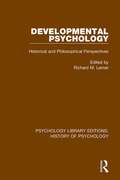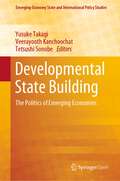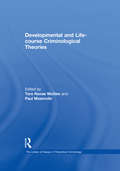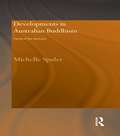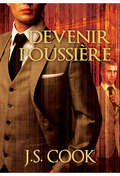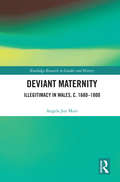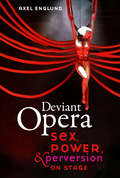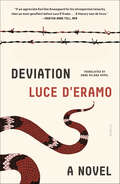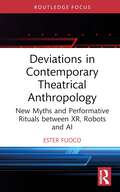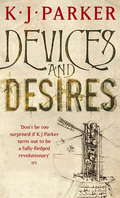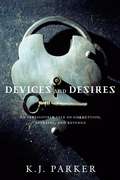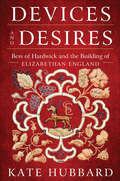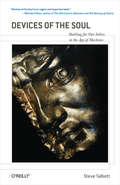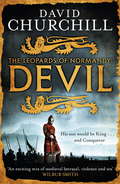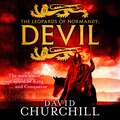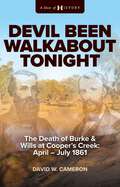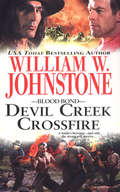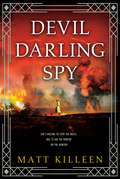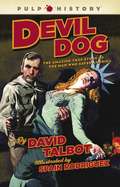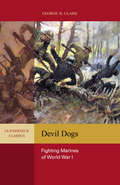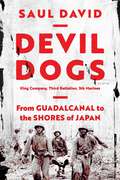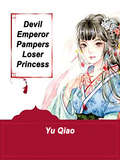- Table View
- List View
Developmental Psychology: Historical and Philosophical Perspectives (Psychology Library Editions: History of Psychology)
by Richard M. LernerOriginally published in 1983, the purpose of this book was to discuss the relations between philosophy and developmental psychology, as those relations existed over the course of the history of the discipline and as they existed at that time. Although not all portions of developmental psychology are surveyed, major proponents of several key areas are represented (e.g. organismic developmental theory, stage theory, life-span-developmental psychology, and the ecological approach to development). In addition, discussion of many currently prominent issues are included (e.g. constancy and change in human development, the use of multivariate models and methods, the role of the context in individual development, and the use of developmental theory in public policy and political arenas). The diversity of approaches and of interests present in the book are representative of the breadth of theoretical and empirical interests found in developmental psychology at the time.
Developmental State Building: The Politics of Emerging Economies (Emerging-Economy State and International Policy Studies)
by Tetsushi Sonobe Yusuke Takagi Veerayooth KanchoochatThis open access book modifies and revitalizes the concept of the ‘developmental state’ to understand the politics of emerging economy through nuanced analysis on the roles of human agency in the context of structural transformation. In other words, there is a revived interest in the ‘developmental state’ concept. The nature of the ‘emerging state’ is characterized by its attitude toward economic development and industrialization. Emerging states have engaged in the promotion of agriculture, trade, and industry and played a transformative role to pursue a certain path of economic development. Their success has cast doubt about the principle of laissez faire among the people in the developing world. This doubt, together with the progress of democratization, has prompted policymakers to discover when and how economic policies should deviate from laissez faire, what prevents political leaders and state institutions from being captured by vested interests, and what induce them to drive economic development. This book offers both historical and contemporary case studies from Japan, South Korea, Taiwan, Singapore, Indonesia, Malaysia, Myanmar, Ethiopia, Kenya, and Rwanda. They illustrate how institutions are designed to be developmental, how political coalitions are formed to be growth-oriented, and how technocratic agencies are embedded in a network of business organizations as a part of their efforts for state building.
Developmental and Life-course Criminological Theories
by Paul MazerolleThe developmental and life-course perspective in criminology came to prominence during the late 1980s and throughout the 1990s a number of theories were developed to explain offending behavior over the life-course. This volume brings together theoretical statements, empirical tests and debates of these major theories within the developmental and life-course criminology perspective. In the first section of the book, original theoretical statements are provided and this is followed by a section which includes empirical tests of each of these theories conducted by researchers other than the original theorists. The final section of the book provides a summary of the major debates both within the developmental and life-course perspective and also between this perspective and others within criminology. This comprehensive volume provides an informative overview of the developmental and life-course perspective in criminology.
Developments in Australian Buddhism: Facets of the Diamond (Routledge Critical Studies in Buddhism #Vol. 22)
by Michelle SpulerThis book examines the adaptation of Buddhism to the Australian sociocultural context. To gain insight into this process of cross-cultural adaptation, issues arising in the development of Diamond Sangha Zen Buddhist groups (one of the largest Zen lineages in the West) in Australia are contextualised within the broader framework of the adaptations of Buddhist teachings and practices in other Westernised countries. The book also examines the methodological approaches currently used for studying this process and suggests a synthesis of the approaches used for studying convert and ethnic Buddhist groups.
Developments in English
by Claudia Claridge Jeremy Smith Irma Taavitsainen Merja Kytö Claudia Claridge Irma Taavitsainen Merja KytöThe history of the English language is a vast and diverse area of research. In this volume, a team of leading historians of English come together to analyse 'real' language, drawing on corpus data to shed new light on long-established issues and debates in the field. Combining synchronic and diachronic analysis, the chapters address the major issues in corpus linguistics – methodological, theoretical and applied – and place special focus on the use of electronic resources in the research of English and the wider field of digital humanities. Topics covered include polemical articles on the optimal use of corpus linguistic methods, macro-level patterns of text and discourse organisation, and micro-features such as interjections and hesitators. Covering Englishes from the past and present, this book is designed specifically for graduate students and researchers working in fields of corpus linguistics, the history of the English language, and historical linguistics.
Devenir poussière
by J. S. Cook Julianne NovaDurant l'hiver glacial de 1891, alors que la nation est encore sous le choc de la crise bancaire de Baring, l'inspecteur Philemon Raft revient d'un congé sabbatique involontaire, et se retrouve chargé de résoudre l'enlèvement de Miriam Dewberry, une jeune fille de bonne famille. Projeté dans un milieu sordide où les classes supérieures se livrent à des investissements honteux, de l'autre côté de l'océan, pour engraisser leur compte en banque, Raft se retrouve perdu sans son compagnon, le constable Freddie Crook. Loin d'offrir son aide, l'élite cherche à tout prix à empêcher Raft de découvrir la vérité au sujet de la malheureuse victime de cet enlèvement, Miriam Dewberry... qui n'existe peut-être même pas. Bientôt, Raft découvre que son vieil ennemi, le maître de l'hospice, John Gallant, est de retour à Londres. Gallant n'a pas avoué ses ambitions, mais il en sait assez pour ruiner la carrière de Raft, et peut-être même sa vie. Raft tente de résoudre cette affaire grâce à sa perspicacité habituelle et étrange, mais d'autres forces plus sombres sont à l'œuvre. Londres est encore terrifiée : c'est le Londres de Whitechapel, de Jack l'Éventreur, le Londres de la pauvreté, de la saleté et du désespoir, où s'engager dans la mauvaise allée pourrait envoyer Raft tout droit à la morgue.
Deviant Maternity: Illegitimacy in Wales, c. 1680–1800 (Routledge Research in Gender and History #41)
by Angela Joy MuirThis is the first-ever book to explore illegitimacy in Wales during the eighteenth century. Drawing on previously overlooked archival sources, it examines the scope and context of Welsh illegitimacy, and the link between illegitimacy, courtship and economic precarity. It also goes beyond courtship to consider the different identities and relationships of the mothers and fathers of illegitimate children in Wales, and the lived experience of conception, pregnancy and childbirth for unmarried mothers. This book reframes the study of illegitimacy by combining demographic, social and cultural history approaches to emphasise the diversity of experiences, contexts and consequences.
Deviant Opera: Sex, Power, and Perversion on Stage
by Axel EnglundImagine Armida, Handel’s Saracen sorceress, performing her breakneck coloraturas in a black figure-hugging rubber dress, beating her insubordinate furies into submission with a cane, suspending a captive Rinaldo in chains from the ceiling of her dungeon. Mozart’s peasant girl Zerlina, meanwhile, is tying up and blindfolding her fiancé to seduce him out of his jealousy of Don Giovanni. And how about Wagner’s wizard, Klingsor, ensnaring his choir of flower maidens in elaborate Japanese rope bondage? Opera, it would appear, has developed a taste for sadomasochism. For decades now, radical stage directors have repeatedly dressed canonical operas—from Handel and Mozart to Wagner and Puccini, and beyond—in whips, chains, leather, and other regalia of SM and fetishism. Deviant Opera seeks to understand this phenomenon, approaching the contemporary visual code of perversion as a lens through which opera focuses and scrutinizes its own configurations of sex, gender, power, and violence. The emerging image is that of an art form that habitually plays with an eroticization of cruelty and humiliation, inviting its devotees to take sensual pleasure in the suffering of others. Ultimately, Deviant Opera argues that this species of opera fantasizes about breaking the boundaries of its own role-playing, and pushing its erotic power exchanges from the enacted to the actual.
Deviation: A Novel
by Luce D'EramoA devoted fascist changes her mind and her life after witnessing the horrors of the HolocaustFirst published in Italy in 1979, Luce D’Eramo’s Deviation is a seminal work in Holocaust literature. It is a book that not only confronts evil head-on but expands that confrontation into a complex and intricately structured work of fiction, which has claims to standing among the greatest Italian novels of the twentieth century.Lucia is a young Italian girl from a bourgeois fascist family. In the early 1940s, when she first hears about the atrocities being perpetrated in the Nazi concentration camps, she is doubtful and confused, unable to reconcile such stories with the ideology in which she’s been raised. Wanting to disprove these “slanders” on Hitler’s Reich, she decides to see for herself, running away from home and heading for Germany, where she intends to volunteer as camp labor. The journey is a harrowing, surreal descent into hell, which finds Lucia confronting the stark and brutal realities of life under Nazi rule, a life in which continual violence and fear are simply the norm. Soon it becomes clear that she must get away, but how can she possibly go back to her old life knowing what she now knows? Besides, getting out may not be as simple as getting in.Finally available in English translation, Deviation is at once a personal testament, a work of the imagination, an investigation into the limits of memory, a warning to future generations, and a visceral scream at the horrors of the world.
Deviations in Contemporary Theatrical Anthropology: New Myths and Performative Rituals between XR, Robots and AI (ISSN)
by Ester FuocoThis book refers to the artistic deviation from dominant goals in a social system or from means considered legitimate in that system.This book explores a "New Humanism" in the performing arts, unique in the sense of human's ability to co-create and communicate beyond spatial and temporal boundaries, wars, and pandemics, through artistic deviations carried out by machines and through the Extended Reality. Through the lens of anthropology and aesthetics, this study selects useful case studies to demonstrate this phenomenon of performative symphonises, in which the experimentation of AI-driven creativity and the new human-robot interaction (HRI) lead to philosophical inquiries about the nature of creativity, intelligence, and the definition of art itself. These shifts in paradigms invite us to reconsider established concepts and explore new perspectives on the relationship between technology, art, and the human experience.This book will be of great interest to students and scholars in theatre and performance studies, anthropology, and digital humanities.
Devices And Desires: The Engineer Trilogy: Book One (Engineer Trilogy #1)
by K. J. Parker'Parker raises the bar for realistic fantasy war craft with this series opener.' - Publishers Weekly'When so many fantasy sagas are tired, warmed-over affairs, a writer like K.J. Parker is more of a hurricane than a breath of fresh air.' - DreamwatchWhen an engineer is sentenced to death for a petty transgression of guild law, he flees the city, leaving behind his wife and daughter. Forced into exile, he seeks a terrible vengeance - one that will leave a trail of death and destruction in its wake.But he will not be able to achieve this by himself. He must draw up his plans using the blood of others ...In a compelling tale of intrigue and injustice, K. J. Parker's embittered hero takes up arms against his enemies, using the only weapons he has left to him: his ingenuity and his passion - his devices and desires.The acclaimed author of The Fencer Trilogy and The Scavenger Trilogy begins a brilliant new series, pushing the boundaries of fantasy fiction with his most powerful novel to date.Books by K.J. Parker:Fencer TrilogyThe Colours in the SteelThe Belly of the BowThe Proof HouseScavenger TrilogyShadowPatternMemoryEngineer TrilogyDevices and DesiresEvil for EvilThe EscapementSaloninusBlue and GoldThe Devil You KnowTwo of SwordsThe Two of Swords: Part 1The Two of Swords: Part 2The Two of Swords: Part 3NovelsThe CompanyThe Folding KnifeThe HammerSharpsSavagesSixteen Ways to Defend a Walled CityMy Beautiful Life
Devices and Desires (Engineer #1)
by K. J. ParkerWhen an engineer is sentenced to death for a petty transgression of guild law, he flees the city, leaving behind his wife and daughter. Forced into exile, he seeks a terrible vengeance -- one that will leave a trail of death and destruction in its wake. But he will not be able to achieve this by himself. He must draw up his plans using the blood of others... In a compelling tale of intrigue and injustice, K. J. Parker's embittered hero takes up arms against his enemies, using the only weapons he has left to him: his ingenuity and his passion -- his devices and desires. "A richly textured and emotionally complex fantasy...Highly recommended." --- Library Journal (Starred Review) "When so many fantasy sagas are tired, warmed-over affairs, a writer like K.J. Parker is more of a hurricane than a breath of fresh air." --- Dreamwatch
Devices and Desires: Bess of Hardwick and the Building of Elizabethan England
by Kate HubbardAided by a quartet of judicious marriages and a shrewd head for business, Bess of Hardwick rose from humble beginnings to become one of the most respected and feared countesses in Elizabethan England—an entrepreneur who built a family fortune; created glorious houses (the last and greatest built when she was a widow in her 70s); and was deeply involved in matters of the court, including the custody of Mary, Queen of Scots.While Bess cultivated many influential cour-tiers, she also collected numerous enemies. Her embittered fourth husband once called her a woman of “devices and desires,” while male historians of the nineteenth century portrayed her as a monster—“a woman of masculine understanding and conduct, proud, furious, selfish, and unfeeling.” In the twenty-first century, she has been neutered by female historians, who recast her as a softhearted sort, much maligned and misunderstood. As Kate Hubbard reveals, the truth of this highly accomplished woman lies somewhere in between: ruthless and scheming, Bess was sentimental and affectionate as well.Hubbard draws on more than 230 of Bess’s letters, including correspondence with the queen and her councilors, fond (and furious) missives to her husbands and children, and notes sharing titillating court gossip. The result is a rich, compelling portrait of a true feminist icon centuries ahead of her time—a complex, formidable, and decidedly modern woman captured in full as never before.
Devices of the Soul: Battling for Our Selves in an Age of Machines
by Steve Talbott"Self-forgetfulness is the reigning temptation of the technological era. This is why we so readily give our assent to the absurd proposition that a computer can add two plus two, despite the obvious fact that it can do nothing of the sort--not if we have in mind anything remotely resembling what we do when we add numbers. In the computer's case, the mechanics of addition involve no motivation, no consciousness of the task, no mobilization of the will, no metabolic activity, no imagination. And its performance brings neither the satisfaction of accomplishment nor the strengthening of practical skills and cognitive capacities."In this insightful book, author Steve Talbott, software programmer and technical writer turned researcher and editor for The Nature Institute, challenges us to step back and take an objective look at the technology driving our lives. At a time when 65 percent of American consumers spend more time with their PCs than they do with their significant others, according to a recent study, Talbott illustrates that we're forgetting one important thing--our Selves, the human spirit from which technology stems.Whether we're surrendering intimate details to yet another database, eschewing our physical communities for online social networks, or calculating our net worth, we freely give our power over to technology until, he says, "we arrive at a computer's-eye view of the entire world of industry, commerce, and society at large...an ever more closely woven web of programmed logic."Digital technology certainly makes us more efficient. But when efficiency is the only goal, we have no way to know whether we're going in the right or wrong direction. Businesses replace guiding vision with a spreadsheet's bottom line. Schoolteachers are replaced by the computer's dataflow. Indigenous peoples give up traditional skills for the dazzle and ease of new gadgets. Even the Pentagon's zeal to replace "boots on the ground" with technology has led to the mess in Iraq. And on it goes.The ultimate danger is that, in our willingness to adapt ourselves to technology, "we will descend to the level of the computational devices we have engineered--not merely imagining ever new and more sophisticated automatons, but reducing ourselves to automatons."To transform our situation, we need to see it in a new and unaccustomed light, and that's what Talbott provides by examining the deceiving virtues of technology--how we're killing education, socializing our machines, and mechanizing our society.Once you take this eye-opening journey, you will think more clearly about how you consume technology and how you allow it to consume you."Nothing is as rare or sorely needed in our tech-enchanted culture right now as intelligent criticism of technology, and Steve Talbott is exactly the critic we've been waiting for: trenchant, sophisticated, and completely original. Devices of the Soul is an urgent and important book."--Michael Pollan, author of The Omnivore's Dilemma: A Natural History of Four Meals and The Botany of Desire: A Plant's Eye View of the World"Steve Talbott is a rare voice of clarity, humanity, and passion in a world enthralled by machines and calculation. His new book, Devices of the Soul, lays out a frightening and at the same time inspiring analysis of what computers and computer-like thinking are doing to us, our children, and the future of our planet. Talbott is no Luddite. He fully understands and appreciates the stunning power of technology for both good and evil. His cool and precise skewering of the fuzzy thinking and mindless enthusiasm of the technology true believers is tempered by his modesty, the elegance of his writing, and his abiding love for the world of nature and our capacity for communion with it. "--Edward Miller, Former editor, Harvard Education Letter"Those who care about the healthy and wholesome lives of children can gain much from Steve Talbott's wisdom. He examines the need to help children spe
Devil (Leopards of Normandy 1): A vivid historical blockbuster of power, intrigue and action
by David Churchill**From the co-author of the No.1 bestselling Wilbur Smith novel, WAR CRY**The fate of England hangs in the balance of a fight between brothers...In DEVIL, David Churchill writes with the immediacy of Conn Iggulden, the epic ambition of Bernard Cornwell and the plotting of CJ Sansom. The Leopards of Normandy trilogy tells the story of William the Conqueror in all its wild, intoxicating, unfailingly dramatic glory.The noble families of Europe are tearing themselves apart in their lust for power and wealth.Emma, Queen of England, is in agony over the succession to her husband Canute's throne ... while her brother, the Duke of Normandy's sons battle in the wake of his death.Robert, the younger son, has been cheated of Normandy's mightiest castle and sets out to take it by force. He emerges from a bloody siege victorious and in love with a beautiful - and pregnant - peasant girl.Robert's child will be mocked as William the bastard. But we have another name for him... Conqueror.David Churchill paints a world seething with rivalry and intrigue, where assassins are never short of work. The fight for the Royal Crown of England continues in the second and third books of the Leopards of Normandy trilogy, DUKE and CONQUEROR.What readers are saying about DEVIL:'This is a most remarkable book, full of wonderful storytelling and historical details. Absolutely outstanding, immaculate and thrilling' 'An exciting and well-told story, backed up by first class research, an extreme attention to detail and strong characterisation which also fits with the historical record. I thoroughly enjoyed it from cover to cover'
Devil (Leopards of Normandy 1): A vivid historical blockbuster of power, intrigue and action
by David Churchill**From the co-author of the No.1 bestselling Wilbur Smith novel, WAR CRY**The fate of England hangs in the balance of a fight between brothers...In DEVIL, David Churchill writes with the immediacy of Conn Iggulden, the epic ambition of Bernard Cornwell and the plotting of CJ Sansom. The Leopards of Normandy trilogy tells the story of William the Conqueror in all its wild, intoxicating, unfailingly dramatic glory.The noble families of Europe are tearing themselves apart in their lust for power and wealth.Emma, Queen of England, is in agony over the succession to her husband Canute's throne ... while her brother, the Duke of Normandy's sons battle in the wake of his death.Robert, the younger son, has been cheated of Normandy's mightiest castle and sets out to take it by force. He emerges from a bloody siege victorious and in love with a beautiful - and pregnant - peasant girl.Robert's child will be mocked as William the bastard. But we have another name for him... Conqueror.David Churchill paints a world seething with rivalry and intrigue, where assassins are never short of work. The fight for the Royal Crown of England continues in the second and third books of the Leopards of Normandy trilogy, DUKE and CONQUEROR.What readers are saying about DEVIL:'This is a most remarkable book, full of wonderful storytelling and historical details. Absolutely outstanding, immaculate and thrilling' 'An exciting and well-told story, backed up by first class research, an extreme attention to detail and strong characterisation which also fits with the historical record. I thoroughly enjoyed it from cover to cover'
Devil (Leopards of Normandy 1): A vivid historical blockbuster of power, intrigue and action
by David ChurchillThe Devil and his Bastard son ...Robert of Normandy is handsome, brave and impetuous - and has just seized Normandy's mightiest castle. But his older brother, Richard, the Duke of Normandy, wants it back ... and will take it by force if need be.Herleva of Falaise is the mere daughter of a tanner but she's more beautiful than any princess and when she and Robert meet, together they will change the course of history.Their illegitimate son, William, is born into a world of murder and intrigue, where families are torn apart by bitter rivalries, renegade warlords stop at nothing in their lust for power and wealth, and professional assassins are never short of work.His enemies will mock him as William the Bastard. But we have another name for him: Conqueror.(P)2015 Headline Digital
Devil Been Walkabout Tonight: The Death Of Burke & Wills At Cooper's Creek: April - July 1861 (A Shot of History)
by David W. CameronThis book focuses on the last three months of Robert O&’Hara Burke, William John Wills, and John King on Cooper&’s Creek. The original expedition which set out in August 1860 was to explore the centre and northern reaches of the Australian continent. The expedition essentially concluded with the death of Burke and Wills on Coopers Creek from starvation and illness in late June and early July 1861. The tragedy was a sliding doors moment in history. Burke, Wills, and King arrived back at the famous &‘Dig Tree&’ camp site, the same day that this manned outpost decided to pack up and return south towards Menindie. They missed each other by a matter of hours. Over the last few decades revisionist history has attempted to place Burke, Wills, and the sole survivor King, within the paradigm of &‘stupid, arrogant white fellas&’ who ignored the wisdom and help of the Yandruwandha people who had successfully carved out a niche along and around Cooper&’s Creek. The story as told by the participants through their diaries, letters, journals, and oral history from members of the Yandruwandha clan tells a completely different story. The three men appreciated that their very survival was dependent on the Yandruwandha and much time was spent trying to keep good relations with the local indigenous clan, with a few odd exceptions. Overall, relations between the two groups were good, and it was for this reason that King survived with the help of the Yandruwandha people – without them he too would have died. This book places the death of Burke and Wills, and the generosity and good will of the Yandruwandha clan in its proper historical context.
Devil Creek Crossfire: Devil Creek Crossfire (Blood Bond #5)
by William W. JohnstoneThere&’s no rest for the blood brothers in a town at war with itself. Hard-charging Western adventure from the bestselling author of Gunsmoke and Gold. Young Matt Bodine and Sam Two Wolves became blood brothers on the day the rancher&’s son saved the warrior&’s life, forging a bond no one could ever break. As years passed, a legend grew of the Cheyenne and the white man who rode together—and who could jerk killing iron with the best of them . . . Devil Creek Crossfire When the brothers head into the small cowtown of Crossville, close by Devil Creek, all they want is to stock up on supplies and rest their weary horses. Instead, they find themselves in the middle of a bloody range war that&’s literally split the town down the middle. The warring factions have set up camp on either side of Main Street, and the newcomers ride in on a deserted strip of no man&’s land where anything—and nothing good—is liable to happen. The feud seems ridiculous: it isn&’t over land or water or cattle rustling, but something much darker . . . and deadlier. Bodine and Two Wolves figure the best course would be to leave—that is, until both sides order them out. Big mistake. Because the blood brothers don&’t take orders from anyone . . . Praise for the novels of William W. Johnstone &“[A] rousing, two-fisted saga of the growing American frontier.&”—Publishers Weekly on Eyes of Eagles &“There&’s plenty of gunplay and fast-paced action.&”—Curled Up with a Good Book on Dead Before Sundown
Devil Darling Spy
by Matt KilleenIn this utterly gripping thriller, Sarah, the fearless heroine of indie bestseller Orphan Monster Spy, hunts a rogue German doctor in Central Africa who might be a serial murderer.It's 1940, and Sarah Goldstein is hiding in plain sight as Ursula Haller, the Shirley Temple of Nazi high society. She helps the resistance by spying on Nazi generals at cocktail parties in Berlin, but she yearns to do more. Then the spy she works for, the Captain, gets word of a German doctor who's gone rogue in Central Africa. Rumors say the doctor is experimenting with a weapon of germ warfare so deadly it could wipe out entire cities. It's up to the Captain and Sarah to reach the doctor and seize this weapon--known as "the Bleeding"--before the Nazis can use it to murder thousands. Joining them on their journey, in of the guise of a servant, is Clementine, a half-German, half-Senegalese girl, whose wit and ferocity are a perfect match for Sarah's. As they travel through the areas now known as the Republic of the Congo and Gabon, Clementine's astute observations force Sarah to face a hard truth: that mass extermination didn't start with the Nazis. This unbearably high-stakes thriller pushes Sarah to face the worst that humanity is capable of--and challenges her to find reasons to keep fighting.
Devil Dog
by Rodriguez TalbotPulp History brings to life extraordinary feats of bravery, violence, and redemption that history has forgotten. These stories are so dramatic and thrilling they have to be true. In DEVIL DOG, the most decorated Marine in history fights for America across the globe--and returns home to set his country straight. Smedley Butler took a Chinese bullet to the chest at age eighteen, but that did not stop him from running down rebels in Nicaragua and Haiti, or from saving the lives of his men in France. But when he learned that America was trading the blood of Marines to make Wall Street fat cats even fatter, Butler went on a crusade. He threw the gangsters out of Philadelphia, faced down Herbert Hoover to help veterans, and blew the lid off a plot to overthrow FDR.
Devil Dogs
by George B ClarkIn telling the story of the extraordinary contributions of the U.S. Marines in World War I, this now-classic history examines the Corps' entire experience in France. Now available in paperback, the book is a valuable resource for data, especially details about each unit and how they functioned. Bolstered with information from official documents as well as published and unpublished memoirs, readers follow the Marines from their recruitment, through training and shipment overseas, to the horrors of trench warfare. The famous battle at Belleau Wood is fully examined, along with the lesser known campaigns at Blanc Mont and Meuse River, and the critical engagements at Verdun, Marbache, and St. Mihiel. Readers learn how the 4th Marine Brigade earned the nickname "Devil Dogs" and why their experiences helped forge the Corps' identity. It is a new addition to the Leatherneck Classics series.
Devil Dogs: King Company, Third Battalion, 5th Marines: From Guadalcanal to the Shores of Japan
by Saul DavidAward-winning historian Saul David reveals the searing experience of the Devil Dogs of World War II and does for the U.S. Marines what Band of Brothers did for the 101st Airborne.The &“Devil Dogs&” of King Company, Third Battalion, 5th Marines—part of the legendary 1st Marine Division—were among the first American soldiers to take the offensive in World World II—and also the last. They landed on the beaches of Guadalcanal in the Solomon Islands in August 1942—the first US ground offensive of the war—and were present when Okinawa, Japan&’s most southerly prefecture, finally fell to American troops after a bitter struggle in June 1945. In between they fought in the &“Green Hell&” of Cape Gloucester on the island of New Britain, and across the coral wasteland of Peleliu in the Palau Islands, a campaign described by one King Company veteran as &“thirty days of the meanest, around-the-clock slaughter that desperate men can inflict on each other.&” Ordinary men from very different backgrounds, and drawn from cities, towns, and settlements across America, the Devil Dogs were asked to do something extraordinary: take on the victorious Imperial Japanese Army, composed of some of the most effective, &“utterly ruthless and treacherous&” soldiers in world history—and defeat it. This is the story of how they did just that and, in the process, forged bonds of brotherhood that still survive today. Remarkably, the company contained an unusually high number of talented writers, whose first-hand accounts and memoirs provide the color, emotion, and context for this extraordinary story. In Devil Dogs, award-winning historian Saul David sets the searing experience of the Devil Dogs into the broader context of the brutal war in the Pacific and does for the U.S. Marines what Band of Brothers did for the 101st Airborne.
Devil Emperor Pampers Loser Princess: Volume 1 (Volume 1 #1)
by Yu QiaoShe was a top assassin in the 21st century! It was the trash, the Third Young Miss, that the people of Zi Yue despised!He was the master of the Blood Underworld. He was incomparably handsome, talented, cold, domineering, and incomparable to a woman!Everyone in the world had insulted her as a worthless trash. He was the only one who had seen through everything. He treated her like a priceless treasure that he would never abandon! She also vowed to take his hand and experience the world!And let's see how they will step up to the peak of the world step by step and look down on the whole world!A certain woman with a head full of black lines looked behind her, eagerly chasing after her. A certain man with a face full of smiles, the corner of his mouth twitched!Are you sure this is the Lord of Blood Underworld?What about the callousness they said?What happened to not being close to a woman?
Devil Emperor Pampers Loser Princess: Volume 2 (Volume 2 #2)
by Yu QiaoShe was a top assassin in the 21st century! It was the trash, the Third Young Miss, that the people of Zi Yue despised!He was the master of the Blood Underworld. He was incomparably handsome, talented, cold, domineering, and incomparable to a woman!Everyone in the world had insulted her as a worthless trash. He was the only one who had seen through everything. He treated her like a priceless treasure that he would never abandon! She also vowed to take his hand and experience the world!And let's see how they will step up to the peak of the world step by step and look down on the whole world!A certain woman with a head full of black lines looked behind her, eagerly chasing after her. A certain man with a face full of smiles, the corner of his mouth twitched!Are you sure this is the Lord of Blood Underworld?What about the callousness they said?What happened to not being close to a woman?
